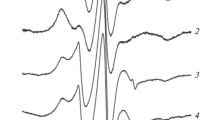Summary
Acid hematin test with pyridine and Sudan black B controls was employed on selected areas of the brains of 115, 140 days fetuses, neonates and adult squirrel monkeys maintained on low and high protein diet. Our histochemical findings indicate that the reduction of phospholipids in the low protein fetuses and neonates is related to myelination, whereas in the adults, most of the lipids are bound to proteins and/or cerebrosides to form complexes, as revealed by the unmasking action of pyridine.
Similar content being viewed by others
References
D. F. Almeida andA. G. E. Pearse, J. Neurochem.3, 132 (1958).
A. G. E. Pearse,Histochemistry, Theoretical and Applied (The Williams and Wilkins Company, Baltimore I. 1968).
Author information
Authors and Affiliations
Additional information
Acknowledgements. This work was supported by U.S. PHS grants RR-00165 HD-06087 from National Institute of Health.
Rights and permissions
About this article
Cite this article
Sharma, S.P., Manocha, S.L. Pyridine as an unmasking reagent for lipoprotein complexes in the nervous system of protein deficient squirrel monkeys. Experientia 32, 1582–1583 (1976). https://doi.org/10.1007/BF01924465
Published:
Issue Date:
DOI: https://doi.org/10.1007/BF01924465




